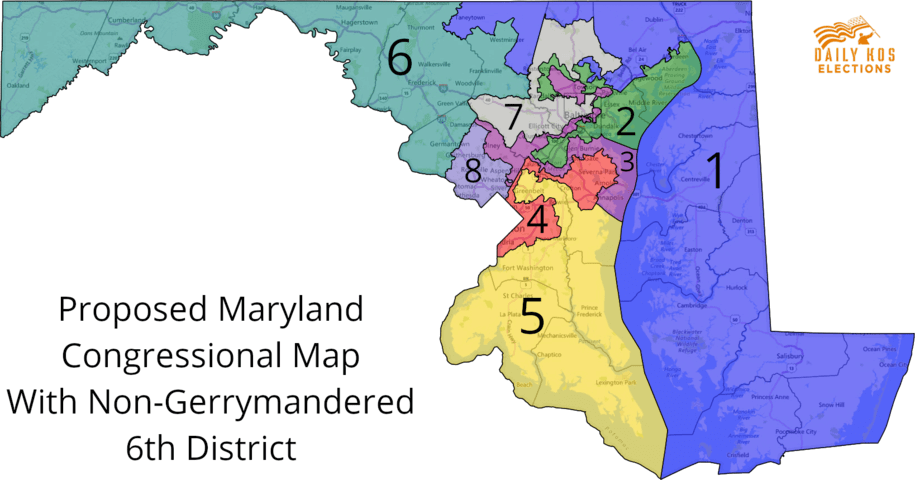Lawmakers Likely to Punt 2020 Congressional Map to Special Session

There is a growing likelihood that the General Assembly will meet in special session this summer to approve a congressional map for the 2020 election, despite an expected plea from Gov. Lawrence J. Hogan Jr. (R) to adopt a map during the current session.
The Emergency Commission on 6th Congressional District Gerrymandering, which Hogan created last fall, last week adopted a proposed map for use next year. The public will have two opportunities to offer feedback on the proposal this month.
The commission’s suggested map seeks to correct deficiencies found by a three-judge federal panel in October, the result of a legal challenge from Republicans in Western Maryland’s 6th District.
Although Hogan aides have expressed hope that lawmakers will adopt the commission’s map in the final week of this year’s session, even GOP lawmakers concede that scenario is unlikely.
The Supreme Court is set to hear arguments in Attorney General Brian E. Frosh’s appeal of the most recent ruling in Benisek v. Lamone, the state’s redistricting case, on March 26.
A ruling is expected sometime before the high court recesses on June 29.
“It’ll be June or something” before the justices rule, said Sen. Michael J. Hough (R-Frederick), whose constituents are among those most impacted by the dispute. “No one is going to re-open and re-draw that map until the Supreme Court rules.”
The commission’s proposal jiggers the line between District 6, the seat currently held by freshman Rep. David J. Trone (D), and District 8, represented by Rep. Jamie Raskin (D).
The map unites Frederick County into the 6th, moves all of Carroll County’s 8th District voters into the 6th, and smoothes the line that runs through northern Montgomery County that separates the two districts.
The state’s other congressional districts would remain as they are now.
The commission itself is coming under new scrutiny in the wake of the resignation of two members.
As the Baltimore Sun first reported, commission member Kathleen Jo Parsons Tabor, a lawyer from Elkridge, registered in 2014 as a lobbyist in the state.
Commission member Matthew Lee Douglas, a policy analyst from Montgomery County, only registered to vote in Maryland last year, after previously voting in Washington, D.C.
When Hogan created the commission last year, with great fanfare, he announced that no lobbyists would be allowed, and he decreed that all members be registered to vote in Maryland for at least three years.
“The governor is playing very cheap politics with this,” said Sen. James C. Rosapepe (D-Prince George’s), chairman of the Senate’s Democratic Caucus. “If he were serious about trying to fix the redistricting system, he’d be working with us, he’d be working with other Republican governors around the country, he’d be working with Democratic governors in a bipartisan way to try to fix the system nationally.”
“Any actions by this commission are called into question,” Del. Kirill Reznik (D-Montgomery) told the Sun. “Clearly, the governor made no effort to actually vet these people.”
That sentiment was echoed Thursday by Maya Rockeymoore Cummings, head of the Maryland Democratic Party.
“If Hogan staffs his sham commission with, by his own standards, fake commissioners, then why should Marylanders treat any of its recommendations seriously?” she said in a statement.
The governor’s press office did not respond to requests for comment.
Tabor and Douglas, who were appointed initially to represent unaffiliated (independent) voters, resigned the day the Sun inquired about their status. Because the commission’s work is coming to an end, it is not expected that they will be replaced.
Damon Effingham, executive director of Common Cause Maryland, the political reform group, called the failure to vet commission members more closely “disappointing” and “frustrating.”
“Obviously that undermines confidence in the decisions that the emergency commission will make… and opens it to attacks from opponents of redistricting reform in general,” he said.
Effingham said the governor’s proposal to create a permanent nonpartisan redistricting commission remains “a great way forward.”
He stressed that if Maryland adopts a nonpartisan redistricting commission, vetting of potential members would be handled by the Maryland State Ethics Commission, not the home-brew approach apparently taken by the governor’s emergency commission.
Maryland maps have been drawn for decades by the Democrats who control the General Assembly and Democratic governors, usually with an eye toward maximizing their chances for victory in future congressional races.
Whether the General Assembly reconvenes in special session this summer will depend on how the Supreme Court rules.
If the justices overturn the 4th Circuit’s 2018 ruling, the state’s current map will stand for the next election. (States will redraw their congressional districts anyway following the 2020 Census.)
If they provide “guardrails” for states to follow in drawing political boundaries, the ruling could have significant implications for all 50 states.
An increasingly likely scenario is that Maryland will end up needing a single-use map for next year’s congressional races — drawn either by the General Assembly, the governor’s commission or the judges who struck down the map Democrats drew in 2011.
“It’s not hard,” Hough said. “The court basically dictated (that) what we have to do is flip the 6th and the 8th around. … So it would look, I would think, substantially similar to what the governor’s commission came up with.”




 Creative Commons Attribution
Creative Commons Attribution